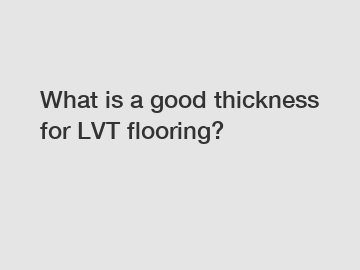What is a good thickness for LVT flooring?
What is a good thickness for LVT flooring?
LVT flooring, also known as Luxury Vinyl Tile flooring, has gained immense popularity in recent years. Its ability to mimic the look of real hardwood or natural stone at a significantly lower cost has made it a preferred choice for homeowners and commercial spaces alike. One of the key factors to consider when choosing LVT flooring is its thickness. The thickness of LVT flooring can vary, and understanding what is a good thickness for this type of flooring is crucial to ensure longevity and durability. In this article, we will delve into the various aspects of LVT flooring thickness and help you make an informed decision.
Why is LVT flooring thickness important?

The thickness of LVT flooring plays a crucial role in determining its durability and performance. A thicker flooring option generally indicates a more robust and resilient product, capable of withstanding heavy foot traffic and wear over time. Thicker LVT flooring also provides better sound insulation and underfoot comfort. However, it is important to note that the ideal thickness of LVT flooring can vary depending on the specific needs and requirements of your space.
What is the industry standard thickness for LVT flooring?
The industry standard for LVT flooring thickness typically ranges from 2mm to 8mm, with 4mm being the most common thickness used in residential applications. This thickness provides a good balance between durability and cost-effectiveness. However, in areas with high foot traffic such as commercial spaces, a thicker variant may be more suitable to handle the heavy wear and tear. In such cases, 6mm or 8mm LVT flooring could be a better option.
Considerations for residential applications.
When choosing LVT flooring for residential use, it is essential to consider factors such as the level of activity and foot traffic in your home. For areas with low to medium traffic, a 4mm thickness should be sufficient. However, if you have children or pets or plan to install LVT in high-traffic areas like entryways or hallways, opting for a thicker flooring option can provide added durability and longevity.
Considerations for commercial applications.
Commercial spaces typically experience much higher levels of foot traffic compared to residential areas. Therefore, it is crucial to choose a thicker LVT flooring option to accommodate the demands of heavy usage. A 6mm or 8mm thickness is recommended for commercial applications such as retail stores, restaurants, and offices, as these variants offer better resistance to wear and tear caused by frequent traffic.
Other factors to consider.
While thickness is an important consideration when selecting LVT flooring, there are other factors to keep in mind as well. The wear layer, installation method, and subfloor condition can also impact the overall performance and durability of the flooring. It is advisable to consult with a professional flooring installer or manufacturer to determine the appropriate thickness based on your specific requirements and budget.
Conclusion.
In summary, the thickness of LVT flooring is an essential factor to consider when choosing the right flooring option for your space. While the industry standard ranges from 2mm to 8mm, the ideal thickness depends on factors such as foot traffic, the level of activity, and the specific application. By assessing these factors and consulting with professionals, you can ensure that your LVT flooring provides the desired durability, comfort, and longevity. For more information or assistance in choosing the perfect thickness for your LVT flooring needs, please don't hesitate to contact us.
Contact us today to find out more about LVT flooring and how to choose the right thickness for your needs.
The company is the world’s best spc flooring for wall, spc flooring supplier, spc flooring hk supplier. We are your one-stop shop for all needs. Our staff are highly-specialized and will help you find the product you need.
197
0
0


Comments
All Comments (0)